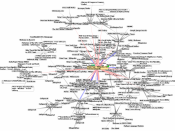Distance education, in a variety of forms has been around for several decades, and a great deal of literature has been generated about the effectiveness of synchronous delivery methods at the university level (Rhodes, 1998). Technological advances in Internet delivery have allowed university course offerings to change from synchronous to asynchronous, and these changes have occurred so rapidly, that Web-based courses have proliferated without significant research into their effectiveness from a student's perspective. It has only been within the past several years that courses have been offered completely online, using the World Wide Web, wherein the student never sets foot in a traditional classroom, and never has to meet face-to-face with an instructor or his fellow classmates. This is changing the face of higher education at a rapid rate, and the number of students who access their education in this manner is increasing rapidly as well. Although we know a fair amount about the implementation of Web-based courses from the institutional side (costs, time, resources, etc.)
(Alavi, Yoo, & Vogel, 1997; Kuittinen, 1998), we have little literature from the consumer side. This paper looks at the state of the literature on student attitudes towards Web-based instruction at the university level.
The literature we do have from the consumer side deals mainly with web-enhanced course instruction, where the instructor has supplemented his course with Web-based technology, ranging from putting syllabi, other course materials and assignments on the web, to virtual simulations and assessment (Allen, 1998; Bowdish, Chauvin, & Vigh, 1998; Chandler & Maddux, 1998; Junk & Fox, 1998; Kuittinen, 1998). The results show that students have positive attitudes in general to web-enhanced course delivery, especially if they feel they have adequate support available (Cooper, 1999; Junk & Fox, 1998; Kuittinen, 1998). Since these courses are still primarily traditional, in that...


